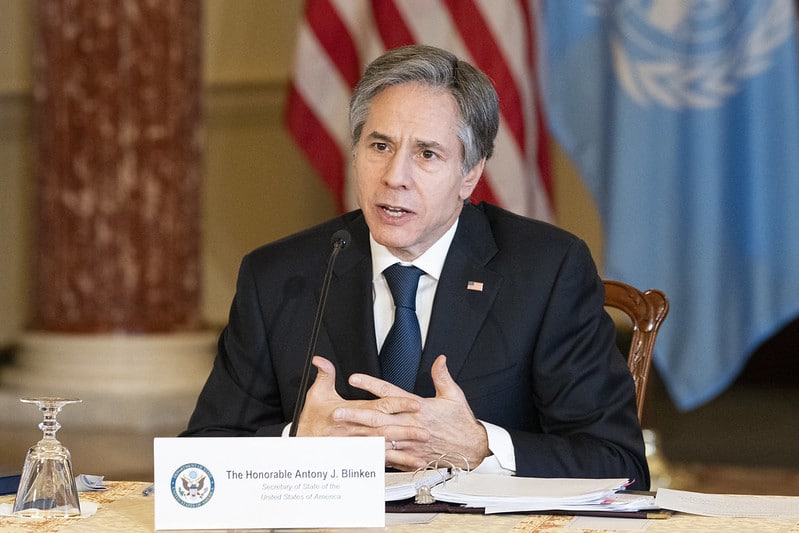The United States on Friday included Nicaragua and Cuba on its black list of countries that systematically violate religious freedom, which entails possible sanctions against these nations.
In the list of Countries of Special Concern, prepared annually by the State Department, China, Saudi Arabia, North Korea, Russia, Iran, Pakistan, Burma, Eritrea, Tajikistan and Turkmenistan repeat this year.
The inclusion of Nicaragua and Cuba is another step in the deterioration of relations between the Joe Biden government and Daniel Ortega’s in Managua and Miguel Díaz-Canel’s in Havana.
At a second level of concern, the United States placed Algeria, the Central African Republic, Comoros and Vietnam.
Around the world, governments and non-state actors harass, threaten, jail, and kill individuals because of their beliefs. Today’s designations keep with our values and interests to protect national security and advance human rights around the globe. https://t.co/ilUY48Bh4i
—Secretary Antony Blinken (@SecBlinken) December 2, 2022
The list of organizations that violate religious freedom includes, among others, the terrorist groups Al Shabab, Boko Haram and the Islamic State (IS), as well as the Taliban, the Yemeni Houthis and the Russian paramilitaries of the Wagner Group.
They commit serious violations of religious freedom
The International Religious Freedom Act of 1998 obliges the US government to draw up an annual list of countries in the world that commit “serious violations of religious freedom”, such as torture, detention and forced disappearance of people for their beliefs.
The countries included in the list are subject to possible sanctions such as the cancellation of scientific and cultural exchanges, the suspension of development assistance, the blocking of loans or export restrictions.
The Secretary of State of the United States, Antony Blinken, promised in a statement that his country “will not stand idly by” in the face of religious persecution.
He criticized that the repression against people for their beliefs “sows division and undermines political and economic stability and peace.”
The persecution of the Catholic Church in Nicaragua
Last August, the State Department denounced the religious persecution to which the Catholic Church in Nicaragua has been subjected since 2018, when the religious welcomed the victims of the repression of the Daniel Ortega regime in their temples and denounced the human rights violations. committed by the state.
Since then, the dictatorship unleashed hate speech accusing the priests of participating in a coup d’état, smear campaigns and threats were also organized that led the Auxiliary Bishop of Managua, Silvio José Báez, to go into exile in 2019. The attacks on the Church now add up to 396 attacks, according to a recent study by the researcher Martha Patricia Molina.
It highlights that only in 2022, until October, there had been 127 attacks, which already represented an increase since 2018. The Bishop of Matagalpa, Rolando Álvarez, is forcibly detained by the Police in his family’s house in Managua Since last August 19, his case has been in limbo because until now he has been accused by the State in the courts, unlike those closest to him.
Before his transfer to Managua at the hands of the authorities, Monsignor Álvarez was confined in the Episcopal Curia, accompanied by three priests, a deacon, a seminarian and a photographer, whom they accused since last September 21 of “conspiracy to commit to national integrity” and propagation of “false news”.
The dictatorship has also prohibited religious processions, imprisoned three other priests: Manuel García de Nandaime, Monsignor Leonardo Urbina de Boaco and to the parish priest Oscar Benavidez Dávila from Mulukuku.
The first was an alleged assault on a woman, who repented of her accusation and was later prosecuted by the State; In the second case, she was for committing the alleged crime of rape and in the last one for a fictional plot, as revealed at the time by the Mosaico site, an independent digital media outlet in northern Nicaragua.
According to the accusation, the State took as actions “destabilizing” In the case of Father Benavidez, the prayers to the Virgin and some “cantatas” of praise. In addition to fabricating legal proceedings, the dictatorship expelled the apostolic nuncio in March and 18 nuns from the order of Mother Teresa of Calcutta in July. It also closed at least eight stations in the north of the country, belonging to the Diocese of Matagalpa.
With information from EFE















